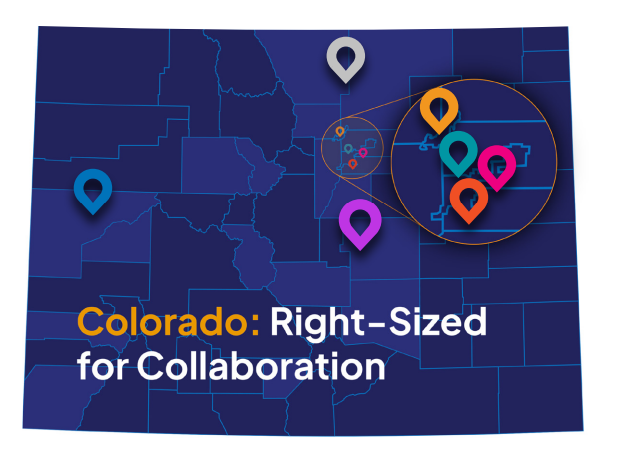Boulder Valley biz, gov leaders join Colorado BioScience Association industry outreach effort

DENVER — The Colorado BioScience Association, through its recently launched Colorado Hub for Health Impact initiative, is partnering with nearly two dozen companies, municipalities and economic-development groups — many of which call the Boulder Valley home — to boost the Centennial State’s biotechnology profile around the nation and globe.
The initiative, described to BizWest by CBSA president Elyse Blazevich as a “new, national economic-development campaign to elevate Colorado as America’s epicenter for life-sciences innovation,” represents “the first-ever large-scale, collaborative effort from our community to attract new life-sciences companies, talent and investment to our state.”
The 22-member consortium will not only serve as a marketing arm for Colorado’s biotech sector but will also work with site selectors to help find the right home for companies relocating to or expanding in the state, and it will assist firms in identifying and securing incentives and investment, according to Colorado Hub for Health Impact leaders.
SPONSORED CONTENT
People Powered: Preparing Longmont Businesses for Economic Success
Longmont Chamber and FNBO present People Powered on April 24, 2024, aiming to inform business owners about workforce development, housing, and transportation issues.
“Colorado is often known as a best-kept secret, but we’re ready to tell our story more broadly on a national level,” Blazevich said. Whether it’s access to a well-educated workforce, venture capital, a centralized location within the nation’s transportation network or a high quality of life, “all of the ingredients in the recipe for success are here.”
Within the consortium there is a subgroup called the U.S. 36 Collaborative. The regional collaborative, made up of chambers of commerce and municipal economic development organizations from Boulder, Broomfield, Lafayette, Superior, Louisville and Westminster, “was formed because so many communities” along the U.S. Highway 36 corridor “have amazing (development) projects going on” that are geared toward attracting biotechnology tenants, Superior economic development manager Jill Mendoza told BizWest. “We have a concentration of life-sciences activity and innovation that we wanted to collectively showcase rather than individually highlight our respective communities. We felt like as a region we have a stronger presence.”
While the U.S. 36 Collaborative does not include groups from nearby Longmont, the Longmont Economic Development Partnership is a partner in the broader Colorado Hub for Health Impact consortium. Hub corporate participants with Boulder Valley connections include AGC Biologics Inc., Sterling Bay LLC and KBI BioPharma Inc.
“Colorado is recognized as the Hub for Health Impact due to its highly educated, innovative, and inclusive population. This is a perfect blend of academics, business leaders, and entrepreneurs. Cities represented by the U.S. 36 Collaborative make up more than 30% of the state’s life sciences assets and are proud to invest in the growth of an industry that’s vital to our region and state,” Joseph Hovancak, vice president of economic vitality at the Boulder Chamber and executive director of the Boulder Economic Council, said in a prepared statement.
According to CBSA, the U.S. Highway 36 corridor between Denver and Boulder is home to almost one-third of Colorado’s biotech companies and research institutions. Nearly 17% of industry is clustered in Northern Colorado, with the remainder mostly concentrated around Denver and Colorado Springs.
“As economic developers, one of the things that set our state apart is that we are so collaborative,” Mendoza said. “We definitely elevate Colorado above any of our respective regions. Our goal is to land a great business in Colorado first and then think about the individual communities second.”
The Metro Denver Economic Development Corp., a key partner in the Colorado Hub for Health Impact organization, “will help facilitate the process so there isn’t competition” between groups in different parts of the state, she said. “It’s about finding the best fit for each business.”
In the past, Colorado has often lacked the facilities to accommodate major life-science players who might consider setting up shop in the region. But recently developers “have made significant investments in our communities to help address” the need for laboratory and flex-office space, Blazevich said. “We now have more than 3.5 million square feet of lab space planned or in construction” throughout the state.
Many of those square feet are being developed or planned along the U.S. 36 corridor in places such as Louisville’s Redtail Ridge, the Coal Creek Innovation Campus in Downtown Superior and Flatiron Park in east Boulder.
“We’ve done the hard work to get these projects to come online,” Mendoza said. “Now it’s a matter of working closely with businesses to (recruit tenants and) realize our vision. …We feel like we’re poised for success in this region and our (local municipal leaders are) very much supportive of this type of activity.”
The Colorado Bioscience Association, through its recently launched Colorado Hub for Health Impact initiative, is partnering with nearly two dozen companies, municipalities and economic-development groups — many of which call the Boulder Valley home — to boost the Centennial State’s biotechnology profile around the nation and globe.
THIS ARTICLE IS FOR SUBSCRIBERS ONLY
Continue reading for less than $3 per week!
Get a month of award-winning local business news, trends and insights
Access award-winning content today!


